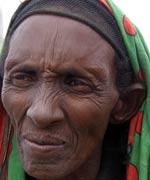DADAAB REFUGEE CAMP, Kenya -- With a boring look on her face, Suldano Abdillahi sat behind her unfinished shack, her mind sunk in thought about how the holy fasting month of Ramadan is passing without her fasting a single day.
“I could not observe fasting this time because I have nothing,” the heavily emaciated woman told IslamOnline.net.
“I have no food to eat; it is surely a huge burden for me at the moment.”
The mother of three boys and a girl is on the verge of starvation and Ramadan caught up with her at a time when she stares into the most difficult livelihood situation.
"I can't bear it, I only have this glass of sugarless tea, and the relief maize I got last month is already out of stock.”
Abdillahi is among the more than 250,000 Somali refugees staying at Dadaab inhospitable refugee camps in Kenya’s parched and bare Northeastern province.
From day one of Ramadan, the famine-famished Sunni refugees have been held between a rock and a hard place.
They are braving horrible living conditions in the camps and the effect of a crippling drought season that is adding insult to their injuries.
“People here are fasting at a very difficult scenario, many do not have access to iftar and suhur meals,” Sheikh Ahmed Abdi, one of the imams at the camp, told IOL.
“The number of people completing a single fasting day are just half, many of them dropout before noon.”
In Ramadan, adult Muslims, save the sick and those traveling, abstain from food, drink, smoking and sex between dawn and sunset.
A spot-check by IOL revealed that almost half of the camp population do not observe Ramadan.
“Fasting in this state is an acid test for the faith,” said Ahmed Omar, a 23-year-old refugee.
“For those with weak ‘iman’ [faith] they will always walk out.”
Endless Suffering
 |
The refugees are braving horrible living conditions and the effect of a crippling drought. (IOL photo) |
For her and many other Somali refugees in the camps, there is no escape from the endless and paralyzing humanitarian crisis.
After fleeing the turbulence pitting her home country Somalia in 1991, there has been no respite from the daily trouble at the refugee camp.
"It seems we will never be out of the woods, for both of us who stayed since 90's and for the new arrivals too," said the spindly mother.
An estimated 8,000 Somalis fleeing the endless conflict and ravaging drought conditions in their home country cross into Kenya every month.
With a refugee population of over a quarter a million, the three camps in Dadaab: Ifo, Hagardheer and Dagahley are teeming with many more Somalis, more than three times the intended capacity of the site.
No aid is in sight from the Muslim world.
IOL correspondent established that there is no single Islamic charity operating in the Somali refugee camps in Dadaab so far.
“We never got any assistance from Muslim organizations, and people here are all the same, no one is better than the other,” laments Hassan Abikar, an ageing refugee.
“No one can share his iftar with another.”
In a sobering assessment released during the third week of Ramadan, Oxfam described the humanitarian situation in the camps as a human tragedy of unthinkable proportions.
The international charity said thousands of Somali refugees in Kenya are living in appalling conditions in overcrowded camps.
For Abdullahi, the 50-year-old mother, the dire situation in the camps this Ramadan is unprecedented.
“I have struggled the previous Ramadan to fast but this time only Allah knows my condition,” she grimaced in agony.
“I’m ashamed, but circumstances here are forcing us to avoid fasting.”
Related Links:



